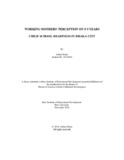Working mothers’ perception on 3-5 years child school readiness in Dhaka city
Abstract
Research on school readiness in Bangladesh is mostly concentrated to explore general mothers'
or teachers' perceptions or relationships between mother and teacher perception. Research
indicates the working rate in Bangladesh is increasing with the enhancing of women's
education. Since they are working mother they get less time to look after the child. So, it’s now
a burning question for the working women to secure and educate their child in a sound way.
This study aimed to explore working mothers’ perceptions of 3 to 5 years of child school
readiness. The study was attempted to know working mothers’ knowledge practices, attitudes,
and actions to promote child school readiness. This study is followed by 3 main research
questions such as: (1) what does the working mother understand about child school readiness?
(2) what are the working mothers’ perceptions (practice and attitude) about child school
readiness? (3) what is the working mothers’ action toward their child school readiness? For
this study, the qualitative research design was formulated. The study selected about 12 working
mothers (6 graduate working mothers and 6 non-graduate working mothers). The data were
collected with two focus group discussions (FGD): one FGD was conducted with six working
graduate mother and the other was conducted with six non-graduate working mothers. And,
four In-depth-interviews (IDIs): two IDIs were conducted with two working graduate mothers
and tow non-graduate working mothers. The study suggested that working mother’s
understanding, knowledge, and practice are influenced by maternal education level and
socioeconomic status. Since graduation complete mother are privileged by educational level
and socioeconomic status so they have shown more advanced knowledge and understanding
about their child school readiness than non-graduate mothers. Mostly graduate working
mothers acknowledged the importance of child school readiness with clear understanding and
intentionally they translate into their practice. On the other hand, non-graduate working
mothers also acknowledged the importance of school readiness but for having ambiguous
knowledge about school readiness often they do not translate into their practice. Despite having
a time constrain, different educational levels, and socioeconomic status there are no major
differences in the mothers' role.

